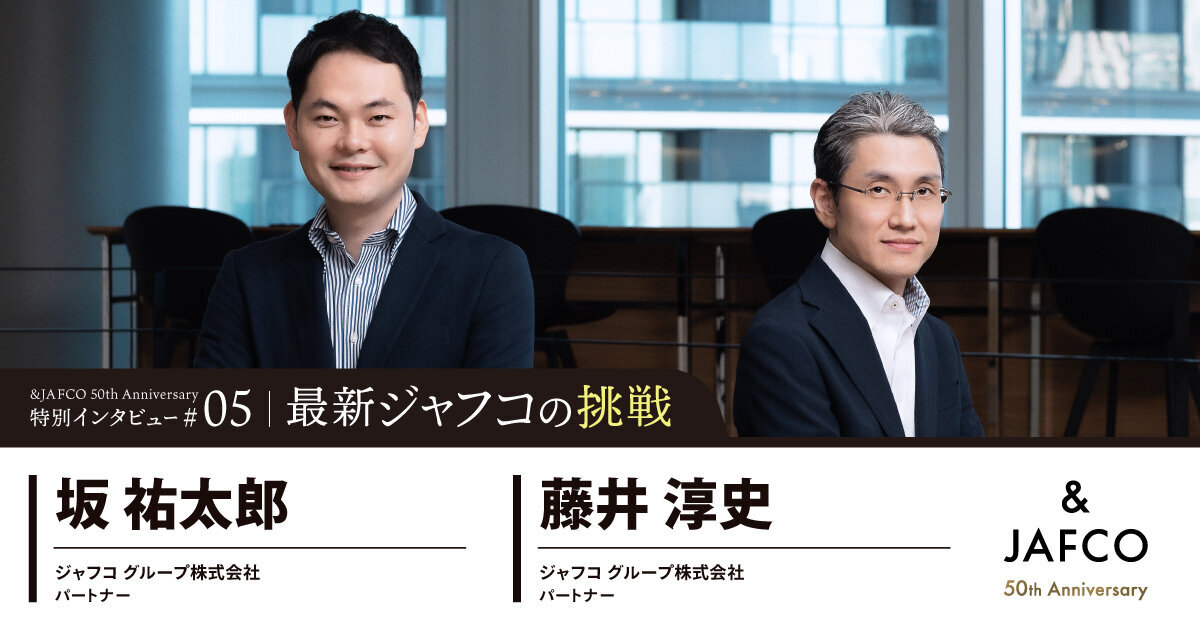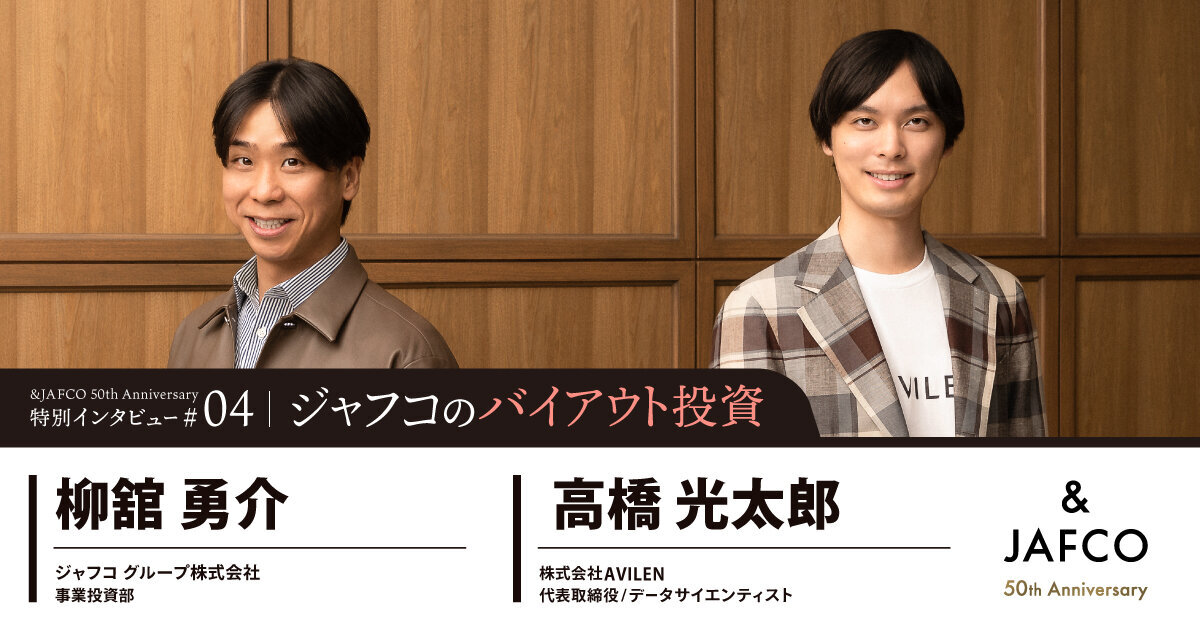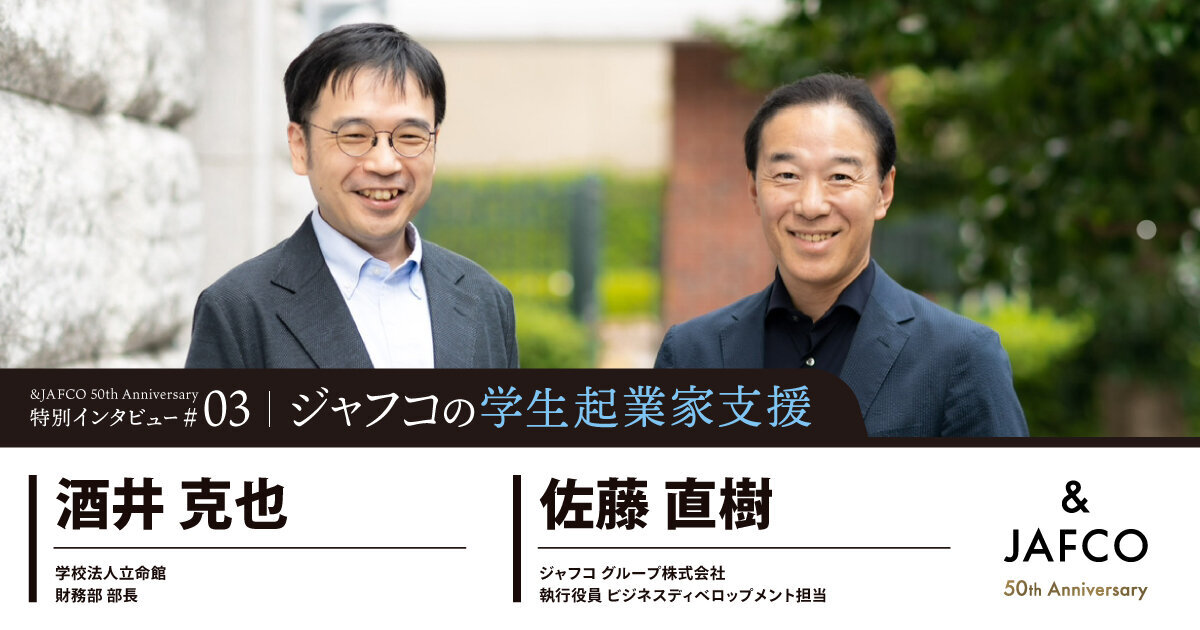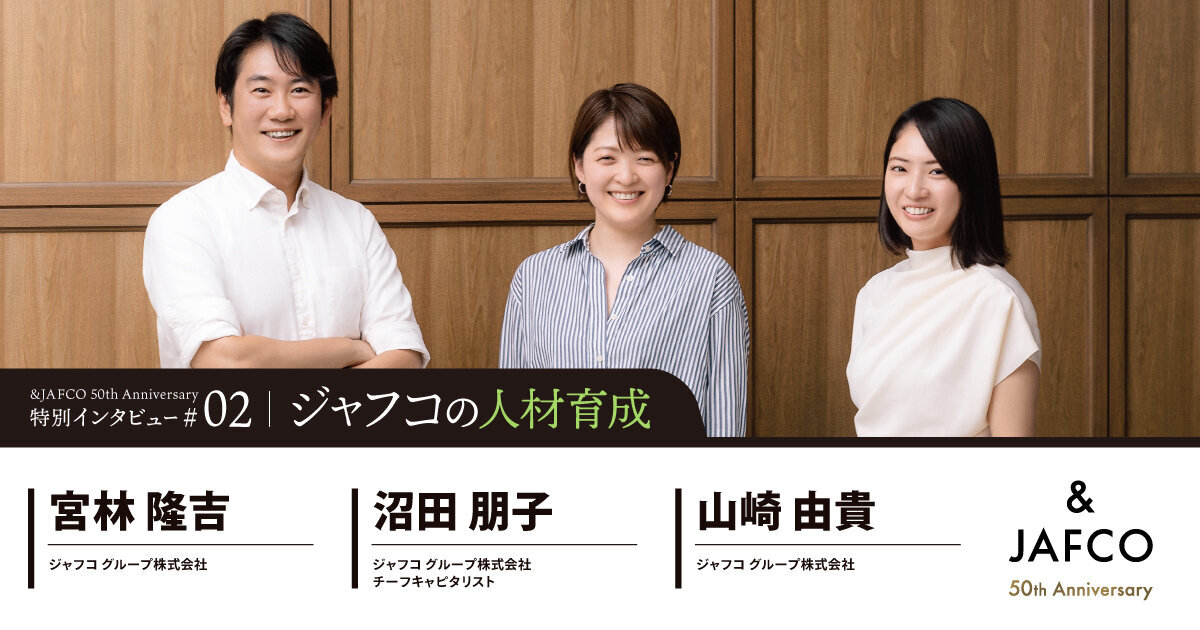JAFCO emerged 50 years ago in 1973 as a trailblazer during the nascent stages of venture capital in Japan. Over the ensuing five decades, JAFCO invested in over 4,100 companies, accompanying visionary entrepreneurs and leaders in creating new ventures and shaping the future.
To discuss the historical perspective, the changing landscape of Japan's startup ecosystem, and the role of JAFCO as a VC in the last 50 years, we interviewed two partners, Atsushi Fujii and Yutaro Saka.
【Profile】
Atsushi Fujii, Partner, JAFCO Group Co, Ltd.
Since joining JAFCO in 2003, Atsushi Fujii has been involved in venture investment. He has invested in Visional, Medpeer, Colopl, and others. He was ranked No. 1 in 2021 on the Forbes Japan's Midas List of most influential venture capital investors in Japan. His primary focus is on the IT sector, but he has also invested in the manufacturing and service sectors. He has been a partner since March 2018.
Yutaro Saka, Partner, JAFCO Group Co, Ltd.
Yutaro Saka joined JAFCO in 2012. His main investments include Money Forward, Chartwork, and WACUL. He was ranked No. 2 in 2017 and No. 9 in 2021 on the Forbes Japan's Midas List of most influential venture capital investors in Japan. Other than investment operations, he has experience serving as CFO of a portfolio company and, as a member of the business development team, he has built the respective foundation of the current sales/marketing, HR, and back-office support operations. He has been a partner since June 2022.
Changes and challenges in the Japanese startup ecosystem over the past decade
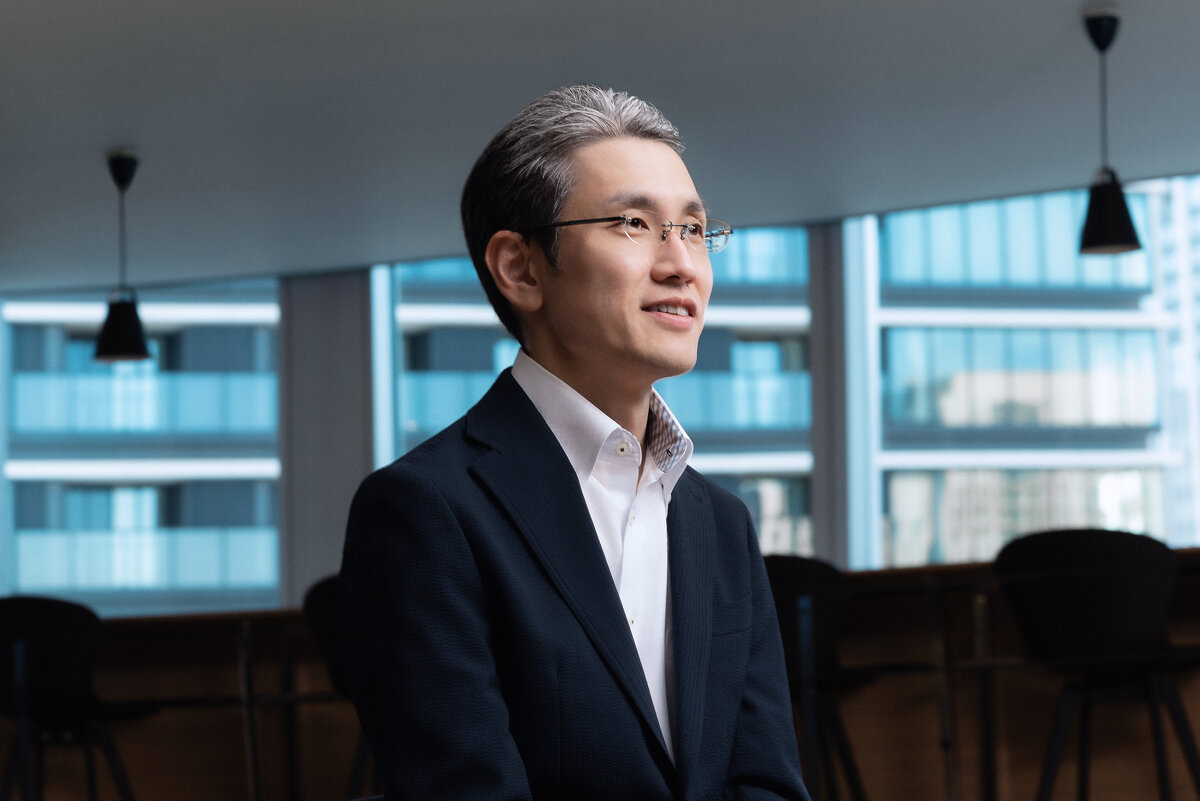
─ Over the past decade, Japan's startup ecosystem has seen significant growth. How do you perceive the changes that have occurred during this time?
Fujii The most substantial change in the last 10 years, in my opinion, is related to personnel and talent. Specifically, there has been a progression in diversification and sophistication of talent. From the perspective of diversification, we've seen an increase in serial entrepreneurs--individuals engaging in consecutive startups. Moreover, there has been a rise in people starting businesses directly after graduating from university or those with experience working in large corporations. These were rare occurrences 20 years ago, but in the past decade, their numbers have significantly grown.
From the perspective of talent sophistication, individuals with diverse experiences are now joining startups during their founding stages. In the past, it was common for a founder to start a company alone and find enthusiastic individuals with little experience, growing their companies through grit and determination. However, today, skilled members with level of experience are contributing to the growth of companies from their early stages. The fact that talented team members are coming together from the initial stages is a significant change that has occurred in the past 10 years.
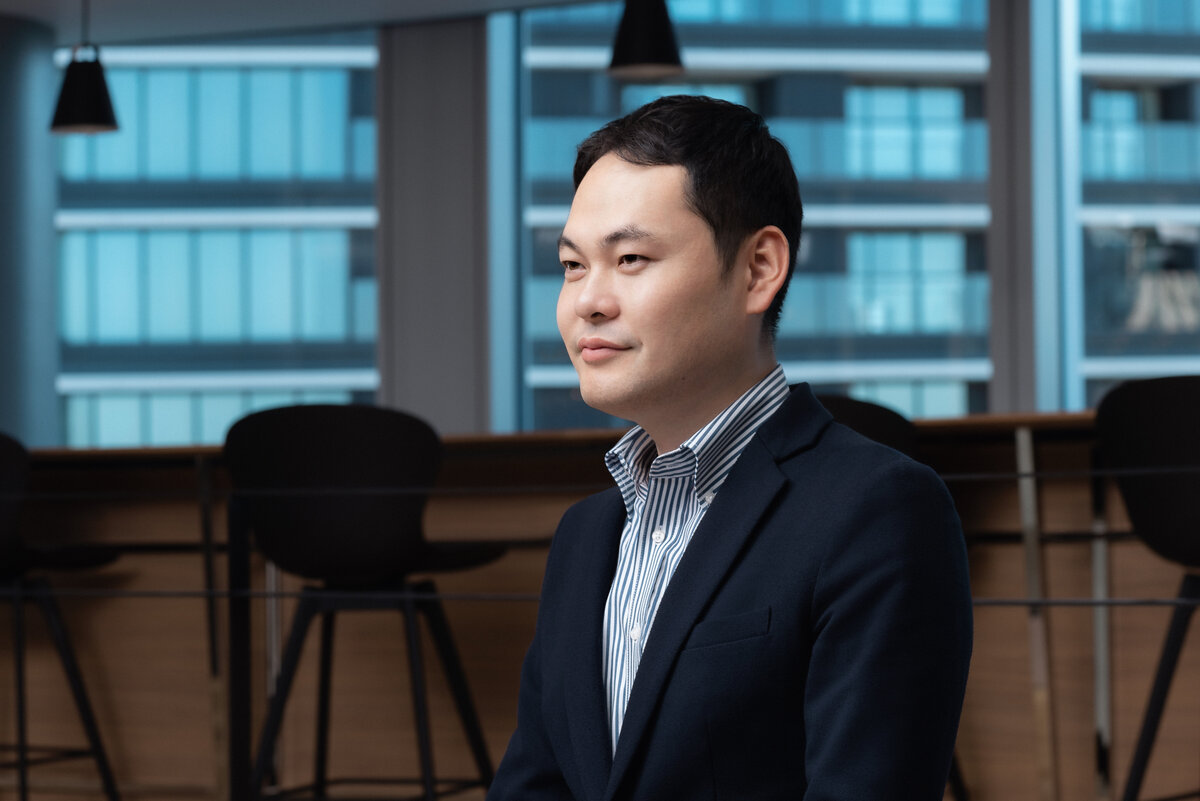
Saka It seems that startups have become more commonplace over the last ten years. With various people entering entrepreneurship, knowledge and know-how about starting a business have accumulated, making it much easier to start new businesses compared to the past. Ten years ago, insights into entrepreneurship were like a black box, and there was a sense of uncertainty about how to proceed.
Now, there are various free tools available, and information about business is easily accessible through business-related media and social networks. The opportunities to feel connected to startups have increased over the last decade, and there has been a generalization of knowledge and know-how about entrepreneurship, making it an era where anyone is able to start a business.
With the increase in individuals aspiring to start businesses and a growing number of serial entrepreneurs aiming for more significant growth, it seems that a cycle of growth, expansion, and reproduction has begun in the startup ecosystem in the last ten years.
─ What do you think of the challenges of the Japanese startup ecosystem compared to those overseas?
Fujii I think that the most prominent challenge is the small scale of success. There are several factors contributing to this, one being the scarcity of successful cases of overseas expansion. In comparison to the US, the amount of funding here is significantly smaller, and we haven't seen companies rapidly growing through a roll-up strategy like with the GAFAM companies.
Without the emergence of companies achieving substantial success, a positive cycle within the startup ecosystem doesn't fully develop. As such, I see this as a significant challenge yet to be tackled.
Many startups aim for rapid growth within a short period, but in this regard, Japan still faces shortages in talent and funding. While challenges in the area of talent are gradually being addressed, on the funding side, involving overseas institutional investors is necessary to raise more substantial funds. To engage them, it's crucial to increase the number of success cases overseas.
Similar to how success stories like Hideo Nomo and Kazuyoshi Miura in sports eventually increased the number of talent, in the startup scene, creating successful cases is essential. In recent years, there's been a gradual increase in startups taking on challenges abroad. If we can generate a few success stories from there, I believe Japan's startup ecosystem will be able to develop further.
Saka It is unfortunate that we still lack a environment where Japanese startups receive natural recognition domestically and globally. The size is one factor, but the sheer number is also a challenge. In Japan, compared to the US, exits tend towards IPOs. Unlike in the US, there are fewer exits through M&As. The lack of diversification in exits over the past decade is also seen as a challenge.
Various reasons contribute to this, but personally, I think the lack of cases where companies have significantly grown through M&As is a major factor. For example, there are no cases comparable to Google acquiring YouTube and experiencing significant growth. Creating cases that become flagship examples through both listings and M&A will become increasingly important in the future.
JAFCO's role in ecosystem development
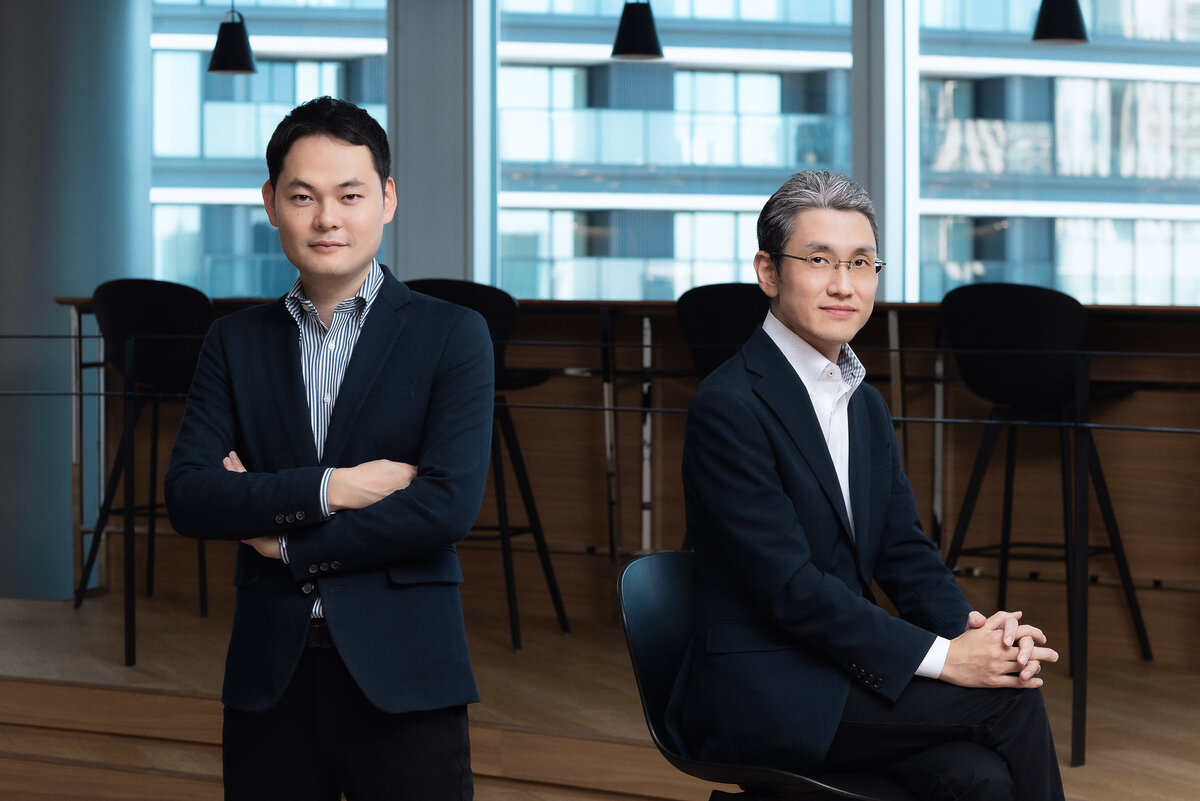
─ What do you feel are the future growth potentials and possibilities for startups in light of these issues?
Fujii I consider the significant diversification and sophistication of talent as a major tectonic shift in Japan's startup ecosystem. As we think about success on a global scale, there has been an increase in entrepreneurs who can overcome language barriers or have past international experiences.
Although market conditions have changed over the past few years, including the ups and downs of the economy, the diversification and sophistication of human resources has led to a strong belief in global success.
On the other hand, if we look at finances, the total capital gains that Japanese VCs obtained through IPOs amounted to approximately 200 billion yen in 2022. However, JAFCO alone has recently formed a fund of around 97.8 billion yen, and other VCs are also forming funds in the class of 100 billion yen. The amount of VC fund formation will essentially be the amount they are planning to invest in stocks. Considering the IPO sales market, VC fund formation amounts are in an inflated state. However, this mismatch is only a snapshot of the current situation, and considering the time lag from investment to exit, fund formation amounts can in a sense be seen as a leading indicator.
I believe that the trend of seeking significant success using the funds formed will lead to significant success in the industry.
Saka Since Fujii provided a quantitative perspective, I'd like to speak qualitatively. The fact that individuals who have experienced success are increasing within the startup ecosystem is significant in the context of the larger fund sizes and the demand for more substantial success.
When I joined JAFCO in 2012, I honestly couldn't imagine startups with a market capitalization exceeding 100 billion yen. However, since then, there have been several startups, such as Visional and Money Forward, with market capitalizations that exceeded 100 billion yen. With entrepreneurs and employees having experienced a world beyond a market capitalization of 100 billion yen, we can now set goals of 500 billion to 1 trillion yen as a tangible and realistic target, not just a dream.
With individuals having this mindset, and with the increased supply of funds and the gathering of talented individuals, I believe that Japan's startup ecosystem can take another step forward in the next 10 years.
─ In this context, what role does JAFCO envision for itself in supporting startups and entrepreneurs?
Fujii As a VC, the crucial thing for JAFCO is how much investment we can make. However, achieving significant increases in investment doesn't happen overnight. Ultimately, to increase the investment amount, we need to expand the size of funds, and for that, we must demonstrate good performance. To achieve good performance, we need to create investment opportunities that lead to significant success.
This is a cyclical process, so to make significant investments, we must always think about ways to enhance the probability of success for startups, even if only b small margins, such as by sharing experiences of success. At the same time, it's crucial for VCs to have a high-resolution understanding of companies that can succeed globally. Without such shared insights, it becomes challenging.
Fortunately, JAFCO has a history of hiring and nurturing new talents internally, and we welcome new talents every year. I feel that the competence of newcomers is increasing each year, and the ability to speak multiple languages is becoming the norm. For JAFCO, it's essential to engage in nurturing these individuals as the next generation moving forward.
Saka JAFCO, as an entity, plays a role like a hub for the venture capital and startup ecosystem. There are several perspectives, but the most crucial aspect in venture capital is capital supply. To create companies that grow significantly, a larger supply of capital is necessary. Of course, JAFCO alone has limitations on the amount of capital it can provide. Therefore, we work on forming funding rounds by involving other VCs, corporate businesses, CVCs, and more. In these efforts, JAFCO always aims to be the lead investor and to lead the funding rounds.
In terms of human resources, JAFCO has long produced a wide variety of capitalists. As the person in charge of new graduate recruitment, I will continue my efforts to recruit and train new graduates and mid-career professionals who are enthusiastic about working in a VC and support them in taking on greater challenges.
Contributing to the entire startup ecosystem by involving various players is one of the reasons for JAFCO's existence, and I believe it is something we should continue to do in the future.
─ Could you also share how you approach your roles as venture capitalists?
Fujii My priority as a venture capitalist is to work closely with entrepreneurs toward the success of their businesses. Given the differing positions of entrepreneurs and investors, there may be instances of conflicting opinions. However, the common objective should be the substantial expansion and success of the business. If consensus can be reached on that, there should be no conflict.
Therefore, we always need to consider how we can complement the areas where startups may be lacking and take action. It's not just about conveying opinions; we actively involve ourselves in solving actual problems. Prioritizing actions for the success of businesses is always on my mind.
Saka In a nutshell, I aim to be a presence that can change the atmosphere in the room. Startups encounter various troubles during the process of business growth. In such situations, entrepreneurs often wonder about what they should do. I want to be the person who can join meetings and reassure entrepreneurs.
Our strength lies in experiencing various troubles through investments in startups. We know what the solutions are for these troubles. That's why we can provide reassurance. I think this kind of presence is significant for entrepreneurs. It combines toughness with kindness. It's my aim to be a reliable presence for entrepreneurs.
50 years of challenge and what further development will require
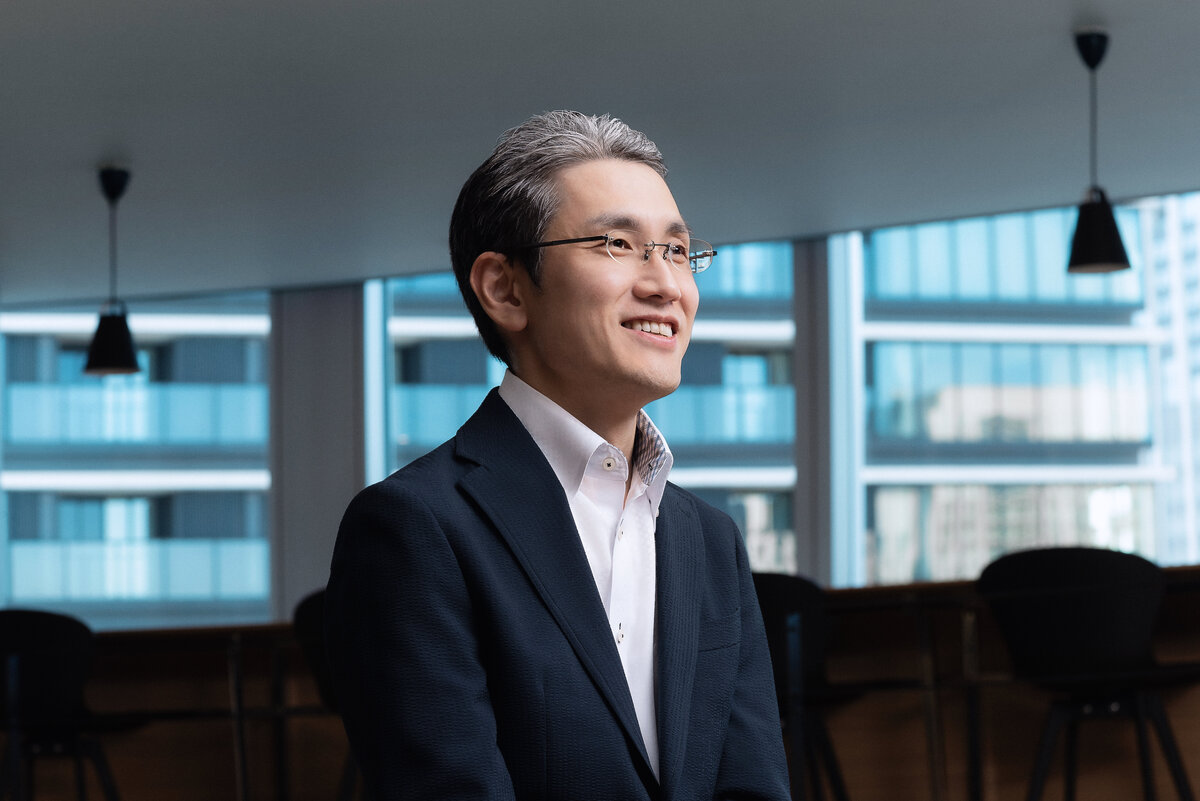
─ Please tell us about any unique strengths of JAFCO or features that other VCs don't have.
Fujii Over the course of our 50 years since establishment, JAFCO has gone through the entire cycle of fund formation, startup investment, and exit multiple times. This extensive experience is a significant asset and a unique strength that sets JAFCO apart from other firms.
Having navigated various eras and environments and accumulated diverse experiences is undoubtedly thanks to the people within the organization. Considering that JAFCO is an organization where individuals come together, it is clear that it has accumulated a wealth of insights and know-how. Additionally, we have been able to establish a cycle of gaining experience until individuals who have not worked at VCs are hired and can claim the title of capitalist. The accumulation of experiences in dealing with investors and startups is a characteristic and strength that, I believe, distinguishes us from other VCs.
Saka One of JAFCO's major strengths is its Business Development Division, an organization that provides support tailored to the growth stages of investment companies, aiming to enhance their corporate value.
Within the Business Development Division, specialists in various fields offer comprehensive support in essential areas that are common to all investment stages, including customer development (sales and marketing), human resources (talent acquisition/development and organizational development), and back-office functions (management operation, structure building, and IPO preparation support).
In customer development, we have facilitated 825 business matchings, mainly with major corporations, during the fiscal year ending in March 2023. In human resources, we supported the recruitment of 37 CxO personnel. Additionally, we assisted 32 companies in IPO preparations. The establishment of such a support system is a unique strength that sets us apart from other firms.
─ What are your thoughts on the future of JAFCO?
Fujii I believe the past 50 years represent a history of JAFCO being a challenger and pioneer. It began with the story of being the first to establish a venture fund in Japan. Since there was a lack of individuals with venture capitalist backgrounds in the market, we have consistently undertaken the challenge and exploration of hiring new graduates and polishing their skills, creating a history of challenge and exploration.
In light of this history, for the next 50 years, we should continue with the same spirit of challenging and exploring. If we consider venture capital as one of the crucial pieces in the startup ecosystem, JAFCO itself must evolve with the times.
While we have explored the Japanese way of doing venture capital in the past 50 years, I think we are now entering a phase of further transforming the Japanese approach. We will continue to learn from overseas practices, but more importantly, we need to challenge ourselves to surpass those benchmarks and aim for further development.
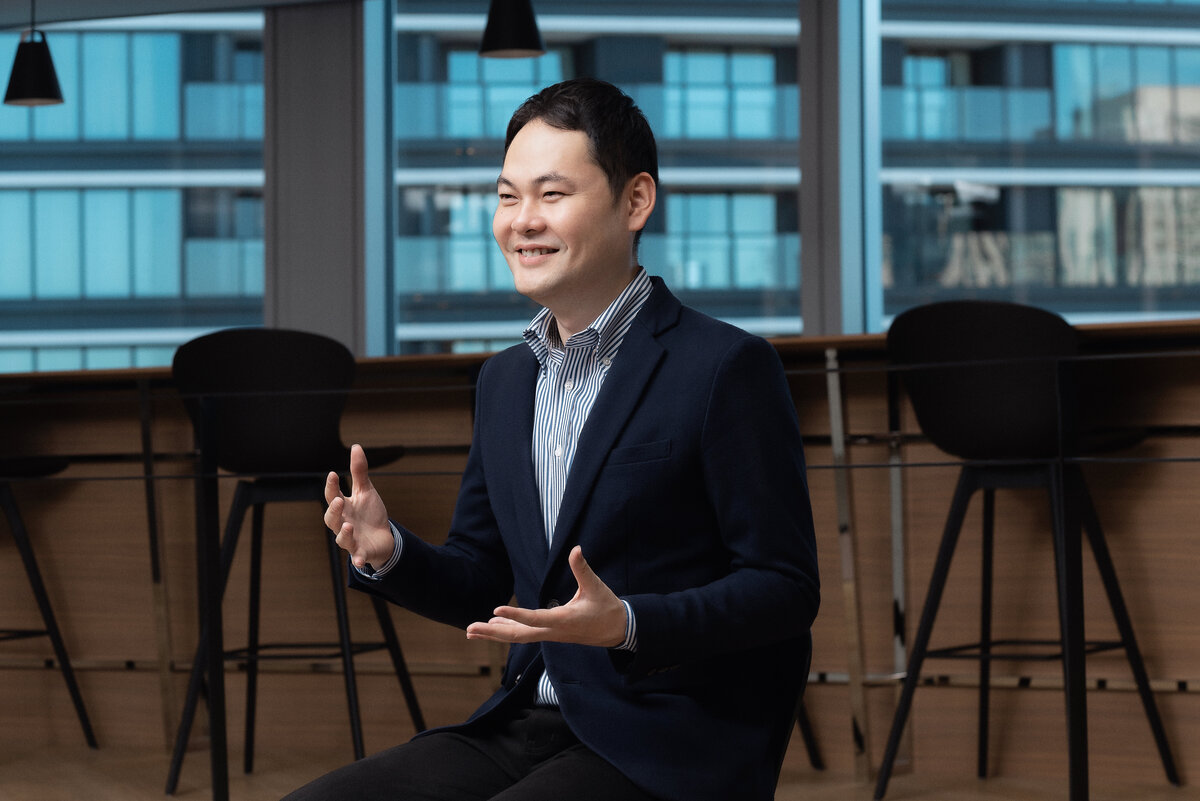
Saka Personally, I think JAFCO is an amazing company. Originating as a joint venture in 1973, it laid the groundwork for investment business unions and funds. Over the years, JAFCO expanded its reach by recruiting talented individuals and backing a multitude of companies, both domestically and internationally, with over 1,000 of them successfully going public. Considering that there are approximately 4,000 listed companies, having invested in and supported over 1,000 is remarkable. I take pride in the fact that JAFCO has played a pivotal role in shaping Japan's startup ecosystem, producing talent that contributed to its development.
In that sense, I hope that in the next 50 years, people will also come to see that Japan's startup ecosystem would have been in trouble without JAFCO and that JAFCO was an essential presence. In the past, there were no players investing in startups, so JAFCO created a mechanism for funding and nurtured talent. Now, with funding becoming more accessible and the number of venture capitalists increasing, what is needed next is to create companies that achieve even greater success.
We will remain committed to our role as challengers and pioneers, continuously addressing the evolving needs of the startup ecosystem. I hope that, through these efforts, we will emerge as a company that, upon reflection, is recognized as having been indispensable presence in the industry.
JAFCO's latest projects
<About the entrepreneurial support program First Leap>
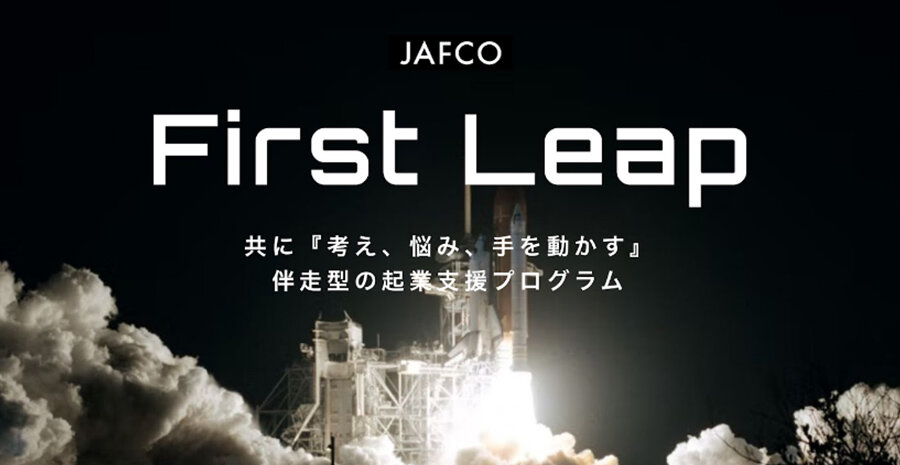
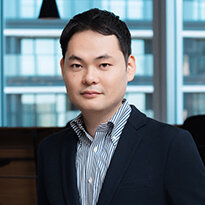 JAFCO has been committed to providing a variety of support to companies at all stages of entrepreneurship, contributing to the realization of entrepreneurs' aspirations. First Leap is a program initiated to extend the mechanisms of corporate support developed through past investment activities to those who are considering entrepreneurship or have recently started. Specifically, it involves individuals aspiring to become entrepreneurs joining JAFCO as "guest entrepreneurs" to receive support in concretizing their business ideas. To broaden the base of aspiring entrepreneurs, it is crucial to collectively consider entry-level business ideas and business models. JAFCO goes beyond traditional mentoring programs, providing support until the actual establishment of customers and revenue. (Yutaro Saka, Partner)
JAFCO has been committed to providing a variety of support to companies at all stages of entrepreneurship, contributing to the realization of entrepreneurs' aspirations. First Leap is a program initiated to extend the mechanisms of corporate support developed through past investment activities to those who are considering entrepreneurship or have recently started. Specifically, it involves individuals aspiring to become entrepreneurs joining JAFCO as "guest entrepreneurs" to receive support in concretizing their business ideas. To broaden the base of aspiring entrepreneurs, it is crucial to collectively consider entry-level business ideas and business models. JAFCO goes beyond traditional mentoring programs, providing support until the actual establishment of customers and revenue. (Yutaro Saka, Partner)
First Leap https://jafcoeir.com/
<About our initiative for expanding corporate networks>


JAFCO, as a hub-like entity, regularly organizes conferences and study sessions focusing on collaborative efforts with companies interested in startups. One notable event is the OFF ROAD new business conference, where experiences in creating new businesses and collaboration in large enterprises are shared. Additionally, JAFCO hosts a monthly seminar, the CVC Study Session, to share insights and expertise cultivated by JAFCO with companies expressing interest in collaboration and investment with startups. Through these initiatives, JAFCO creates connections, aligning business companies to its portfolio companies according to specific needs. (Masanori Hashimoto)
<About Career Academy>

 JAFCO conducts activities under the banner of Career Academy, a school for careers. The academy aims to increase the number of people challenging startups by expanding awareness of working in startups, understanding personal aptitude, and providing ongoing educational support, including post-employment. A key focus in this initiative is the tangible feel of the content. When creating content for Career Academy, JAFCO conducts interviews with portfolio companies, shaping workshops and other activities based on the challenges faced by those actively working in those companies. Though this initiative is relatively new, the goal is to raise awareness and establish the image that if individuals are uncertain about their careers, they can turn to Career Academy for guidance. (Shintaro Kanazawa)
JAFCO conducts activities under the banner of Career Academy, a school for careers. The academy aims to increase the number of people challenging startups by expanding awareness of working in startups, understanding personal aptitude, and providing ongoing educational support, including post-employment. A key focus in this initiative is the tangible feel of the content. When creating content for Career Academy, JAFCO conducts interviews with portfolio companies, shaping workshops and other activities based on the challenges faced by those actively working in those companies. Though this initiative is relatively new, the goal is to raise awareness and establish the image that if individuals are uncertain about their careers, they can turn to Career Academy for guidance. (Shintaro Kanazawa)
キャリアアカデミー https://career-academy.jp/
Photography: Shunichi Oda
Design: Asuka Itsumi
Planning: Mai Tokui (JAFCO) / Akiko Komiya (PRAS)

